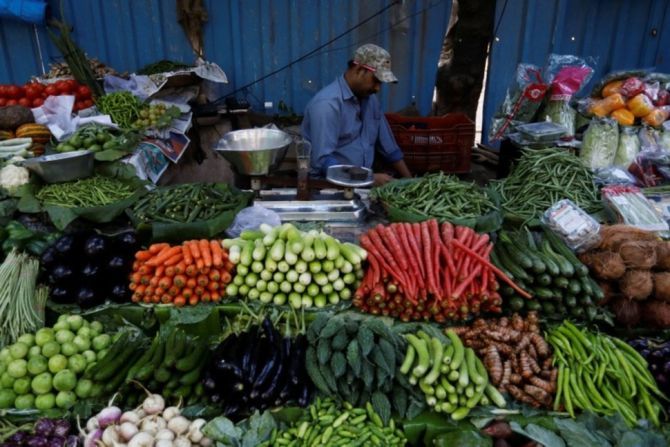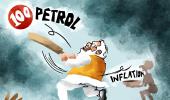Headline inflation will come down under the 6 per cent mark in July itself but will stay at an elevated level of over 5 per cent for some time, Chief Economic Advisor K V Subramanian said on Thursday.

Such an outcome will get the price rise back into the upper-end of the target band given to RBI, he said, adding that consumer price inflation had breached the mark for three consecutive quarters last fiscal because of supply side issues like challenges in movement of goods.
"With reasonable probability, I expect this month the (inflation) print to come less than 6 per cent," Subramanian told a conference organised by industry lobby Ficci.
Right after data for May showing inflation at 6.4 per cent had come out, Subramanian said he had predicted it will cool down in internal meetings and also during "deliberations with the regulator".
The sequential momentum in the number is range-bound despite the challenges posed by factors like commodity price rises, he added.
The CEA said in FY21, inflation was impacted because of the first wave of the pandemic which lasted longer, while the second wave saw distributed lockdowns and did not have a deep impact on inflation.
The RBI has been holding rates to aid growth despite the surge in inflation. However, after the recent data prints, concerns have been expressed over the price rise.
The next monetary policy meeting of the central bank will be held during August 4 - 6.
On the growth front, Subramanian said the FY22 number should be within the ballpark of 10.5 per cent as estimated by the finance ministry earlier.
It can be noted that the RBI had revised down its estimate to 9.5 per cent given the reverses of the second wave.
Subramanian added that the second wave lasted only for 6-8 weeks, and hence its impact on growth will not be as stark as the first wave of the pandemic which was on for 6 months, and led to a 7.3 per cent contraction in the GDP in FY21.
Referring to the International Monetary Fund (IMF) revising down its growth projection sharply, he said the government had not given an aggressive growth estimate from early on and pointed to the 12.5 per cent estimate of the IMF as a case in point.
Subramanian insisted that when we compare the economic performance in FY21 with the one in the first quarter of this fiscal, the economy did achieve a V-shaped recovery at the macro level.
However, some segments like the urban poor and small businesses did not achieve the same success as large firms, leading some to call it a K-shaped recovery which is inequitable, he said, adding the government has tried to minimise the impact on the affected segments through targeted interventions.
Even if there is a third wave of the pandemic, the intensity of that will be lower, he said.
The country is getting close to herd immunity now with over 40 per cent of the population getting vaccinated with at least one shot and sero surveys showing two-thirds of Indians carrying COVID antibodies, he pointed out.
The government will not breach the 6.7 per cent fiscal deficit target for FY22, he said, asserting that the target itself is not too large when compared to peer group of countries.
It will not resort to any cuts on expenditure but will in fact advance the capital expenditure to Q2 and Q3 of FY22 rather than doing it in the last quarter, he said, adding that it will continue with the policy of cutting wasteful revenue expenditure.
Explaining the fiscal math, he said the Rs 1.75 lakh crore divestments assumption for FY22 does not include proceeds from privatisation of two state-run banks and insurers.
Additionally, the tax collections on both the direct and indirect fronts have been doing good and will ensure healthy mop-up for the year.
The reforms undertaken by the government are as path-breaking as the ones carried out in 1991, and will help by raising both investment and productivity in the economy, he asserted.
The reforms should help the economic growth reach 6.5-7 per cent from FY23 and accelerate to 8 per cent thereafter, he said.
Photograph: Danish Siddiqui/Reuters











 © 2025
© 2025